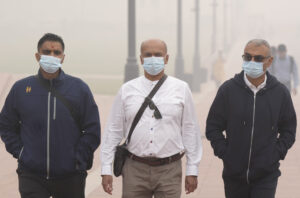Delhi’s pollution levels worsened Monday, with an AQI of 484 placing the city in the ‘severe plus’ category. The Supreme Court criticized the delay in implementing Stage 4 of the Graded Response Action Plan (GRAP), which came into effect Monday morning, and underscored that scaling down these measures would require its explicit approval.

“How can you take risks in these matters by delaying applicability of Stage 4 of GRAP?” the court questioned, reiterating that preventive measures must remain until further orders. Justice Abhay S. Oka and Justice Augustine George Masih called for an explanation from the Delhi government regarding its actions to combat the crisis.
The CAQM’s Stage 4 measures include a ban on non-essential trucks and construction activities. It also advised NCR offices to operate at 50% capacity, with the rest working from home. Schools in Delhi moved most classes online, except for Grades 10 and 12.
Low visibility caused by dense smog disrupted flight operations at Delhi airport, leading to the diversion of 11 flights. Officials noted that a lack of CAT III-trained pilots further compounded the issue. The Delhi government stated that the measures were now in place but faced scrutiny for the delay.
The GRAP framework, implemented since 2017, categorizes air quality into four stages, with Stage 4 triggered when AQI exceeds 450. The national capital saw worsening conditions as AQI levels rose from 441 on Sunday evening to 484 by Monday morning, leading to severe impacts on public health and infrastructure.

